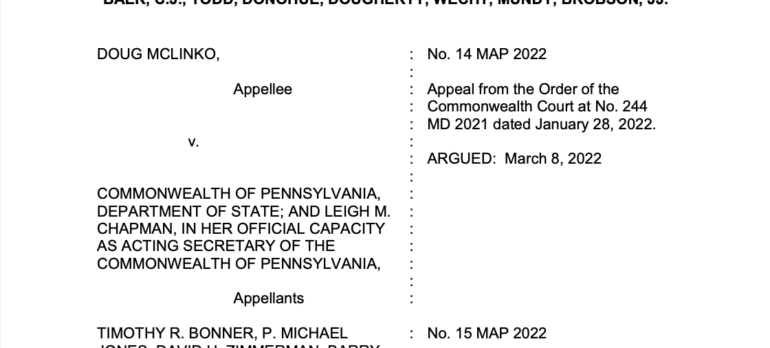
Pennsylvania Supreme Court Chooses Politics Over the Constitution in Upholding Mail Voting Law
The Pennsylvania Supreme Court forsook 160 years of controlling precedent and constitutional interpretation to uphold Act 77, Pennsylvania’s no-excuse absentee voting law. Litigation has been ongoing over the past year challenging the constitutionality of Act 77 under the Pennsylvania Constitution.
Historically, Pennsylvania voters alone possessed the power to approve any and all expansions to who may vote by mail by constitutional amendment. Today’s decision to uphold Act 77, however, which was decided on purely partisan grounds, permanently undermined this power. The Court’s five progressive justices turned a blind eye to the clear text of the Pennsylvania Constitution, which expressly limits who is eligible to vote by mail. The Court held, “We find no restriction in our Constitution on the General Assembly’s ability to create universal mail-in voting.”
Wally Zimolong, Co-Counsel to Bradford County Commissioner Doug McLinko, who challenged the law, states:
We are disappointed by today’s ruling. It is an outcome-based opinion used to justify overturning 160 years of judicial precedent and redefining the phrase “offer to vote.” We believe that we made a clear, concise and constitutional argument that permitting mail-in ballots required a constitutional amendment. The Commonwealth Court of Pennsylvania agreed with our position and, unfortunately, the Supreme Court did not. This is also a reminder that elections matter and that Pennsylvania voters must effectuate a change to Act 77 at the ballot box.
Harmeet Dhillon, Co-Counsel to Commissioner McLinko, stated:
The Pennsylvania Supreme Court made its case for being the most politically motivated court in the country today. It ignored Pennsylvania’s Constitution and 160 years of clear precedent, citing a bipartisan political process. Courts are traditionally a check on the legislature when it violates the peoples’ fundamental rights enshrined in the state constitution, but the Pennsylvania Supreme Court abdicated that role today, and election integrity is the worse for it.
Lawyers Democracy Fund (LDF) Vice President Tom Spencer added:
This decision is a results-oriented opinion that rewrites 160 years of Constitutional history in Pennsylvania all to reach a desired policy result. In upholding Act 77, the progressive justices on the Supreme Court stripped Pennsylvania voters of their exclusive power to expand who may vote by mail in Pennsylvania. This is a loss for voters, and this is a loss for the rule of law in Pennsylvania.
Lisa Dixon, Executive Director of LDF, said of the decision:
Pennsylvania voters should be able to trust that the Pennsylvania Constitution means what it says, not what the justices of the state Supreme Court want it to say. This case was about respecting the exclusive power of the voters to expand mail voting, the limitations of Pennsylvania’s Constitution, and the rule of law. Unfortunately, the majority respected none of these in its decision to uphold Act 77.
In July 2021, Commissioner McLinko brought an action for declaratory judgment on the constitutionality of Act 77 with LDF’s support. The Pennsylvania Constitution––Art. VII, Sec. 14––expressly limits mail voting to only certain qualifying electors; therefore, Act 77 unlawfully circumvented Sec. 14 to allow anyone to vote by mail without allowing the voters to decide by constitutional amendment.
LDF successfully challenged Act 77 at the Commonwealth Court, which found Act 77 violated the Pennsylvania Constitution. Nevertheless, the Pennsylvania Supreme Court reversed this decision, forsaking the clear text of the Constitution and over a century and a half of constitutional history to uphold Act 77, a law that is not yet 3 years old.
Justice Mundy’s dissent in today’s ruling provides a helpful summary of where the majority erred:
Notably, neither the majority nor the concurrence provides a convincing account of how our state Charter permits universal, no-excuse mail-in ballots, particularly in light of its specific authorization for absentee ballots for four defined groups of voters. The majority opinion in particular takes an approach that, if not ahistorical, is at best historically selective. Its most glaring omission is its failure to come to grips with the fact that the Pennsylvania Constitution’s election-related provisions have been amended on numerous occasions in the 160 years since this Court first explained that by default it requires in-person voting, and in none of those instances have the people of this Commonwealth sought to eliminate, alter, or clarify the textual basis for that ruling as it appears in our organic law.
Today marks the end of 160 years that the Pennsylvania Supreme Court has interpreted the state constitution to require voters to “offer to vote” in person unless they met the qualifications — also set forth in the constitution — for voting absentee. Today’s party-line decision by five Democratic justices overturned more than a century and a half of precedent, but this is not the first time that this activist Court has broken with precedent to reshape election law in a way that favors their preferred political party. This ruling is a reminder of the importance of staffing the courts with judges who take seriously their obligation to interpret the law — not make it.
LDF will continue to support efforts like this to strengthen election integrity both at the state and national level.
To view the Pennsylvania Supreme Court’s opinion, click here.
To learn more about this litigation, visit LDF’s Pennsylvania page.

